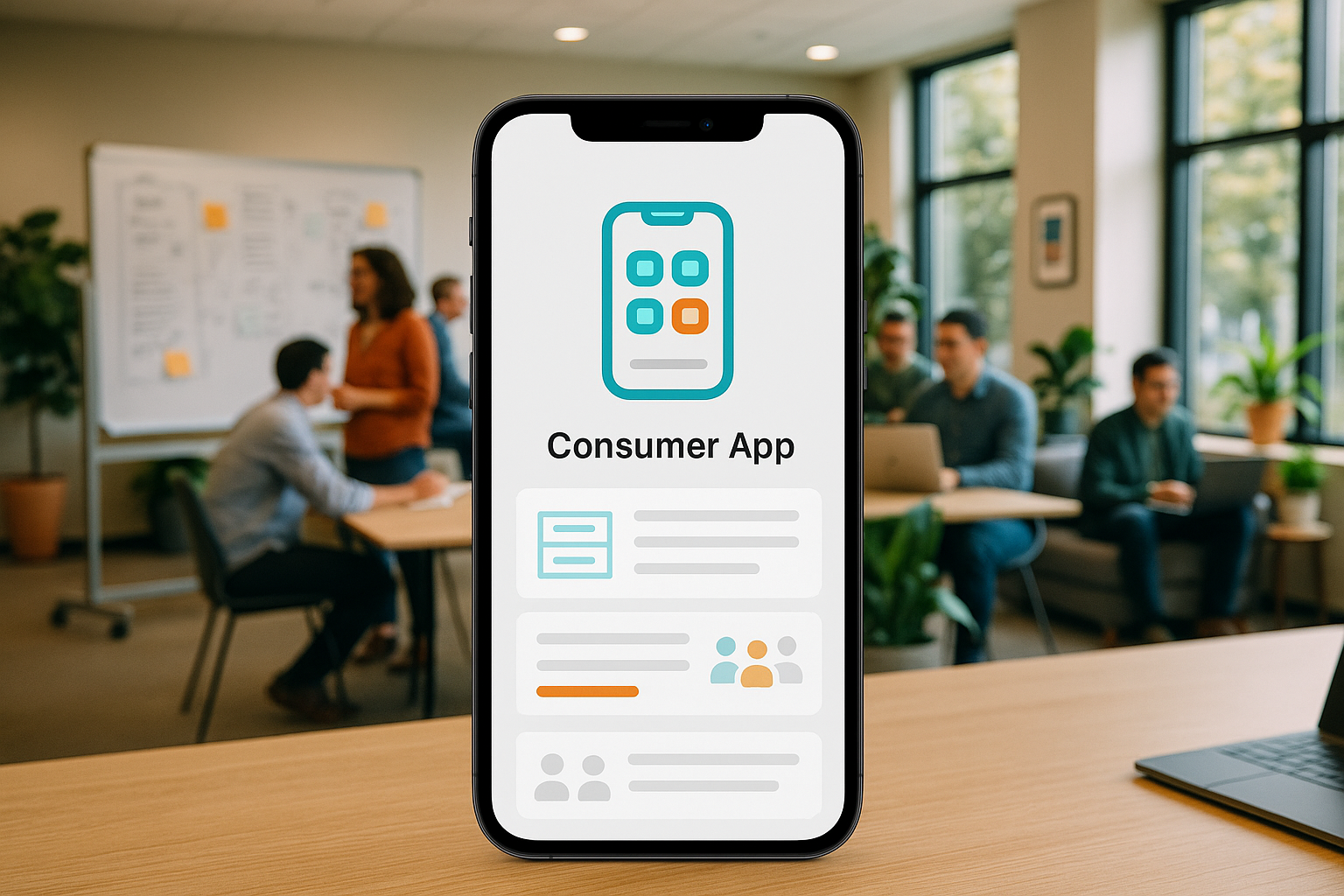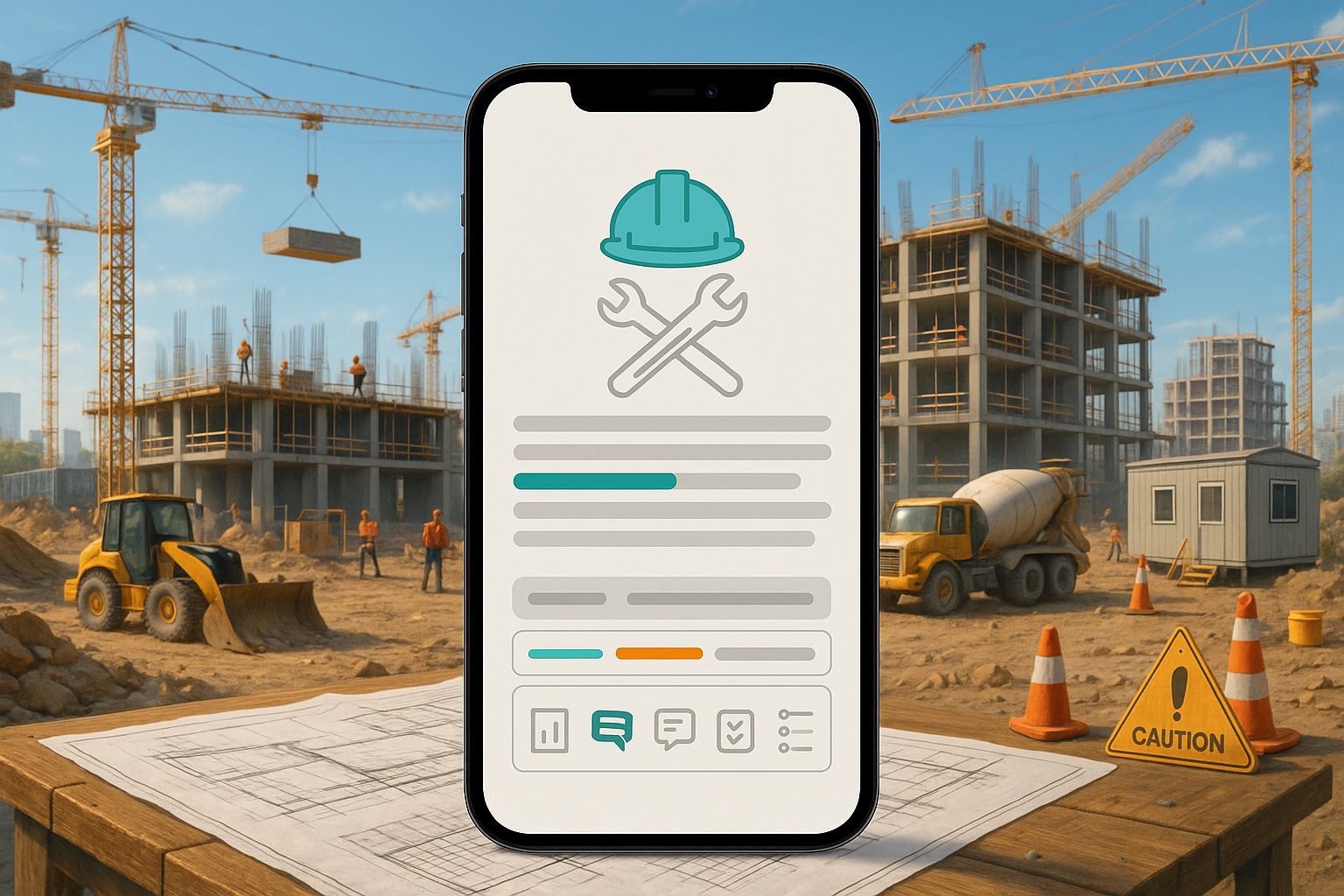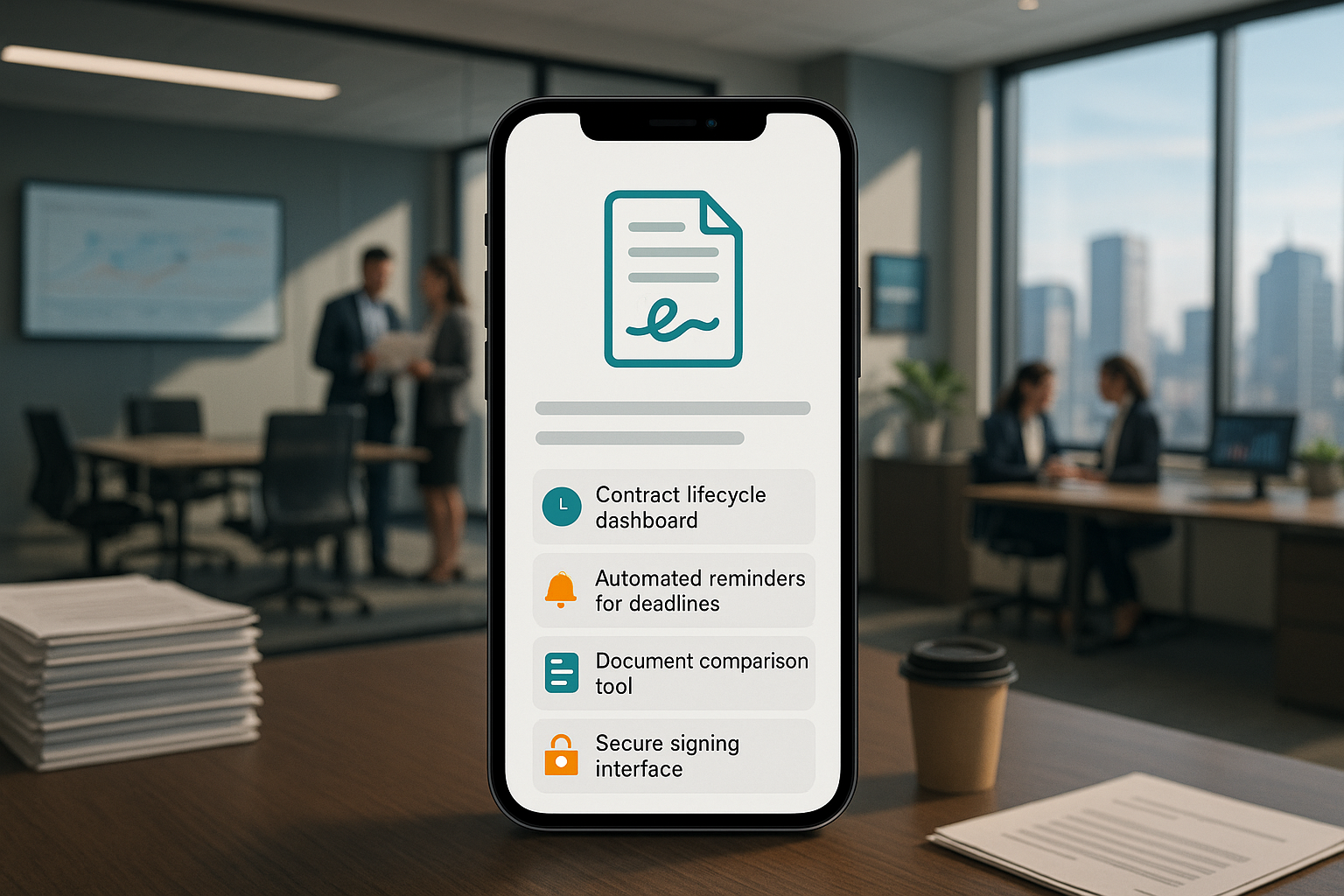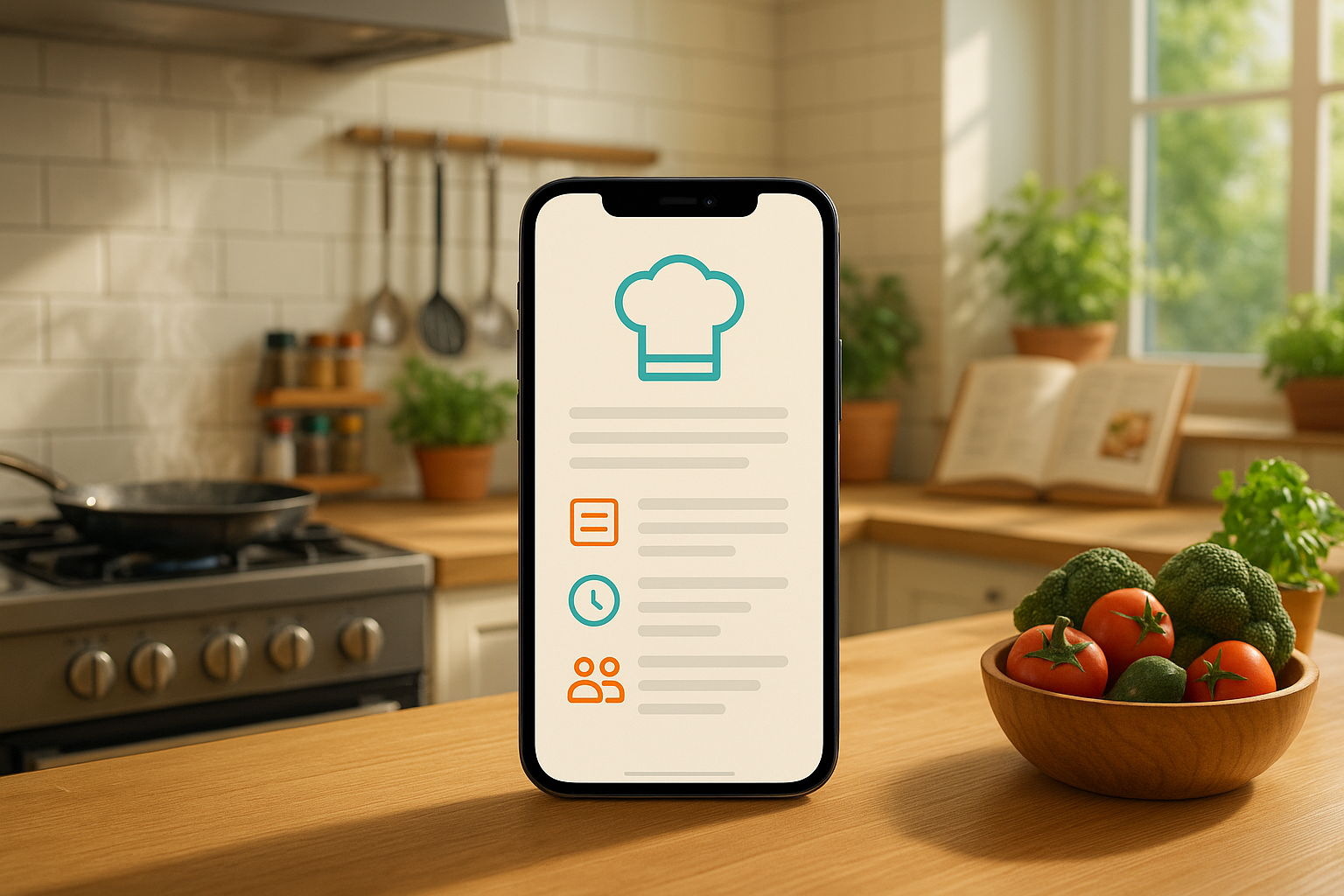Introduction
You have a groundbreaking idea for a mobile app. You can see it clearly: people scrolling, tapping, and engaging with a product that makes their lives more entertaining, convenient, or connected. But transforming that vision into a tangible, successful consumer application is a monumental task. The path is fraught with challenges, from sourcing specialized development talent and managing spiraling costs to navigating the complexities of user experience design and market launch. Many businesses with brilliant concepts find themselves stalled by the sheer scope of the project.
This article is a comprehensive guide to navigating the world of consumer app development. We will demystify the process, providing clear insights into what defines a consumer app, why building one in-house is so difficult, the different categories they fall into, and what you can realistically expect to invest.
More importantly, we will show you how partnering with a seasoned development firm can be the key to your success. As a top US AI-powered mobile app development agency, we at MetaCTO have guided countless projects from concept to launch and beyond. With over 20 years of experience and more than 120 successful projects, we provide the expert strategy, design, and development needed to build, grow, and monetize your app. This guide will equip you with the knowledge you need, and we will be here to help you take the next step.
What is a Consumer App?
At its core, a consumer app is a software application designed for the general public. These are the apps people scroll through daily on their smartphones and tablets. Think of social media platforms, mobile games, fitness trackers, or weather forecasting applications. Their primary purpose is to fascinate and engage individuals, enhancing their lives by providing entertainment, knowledge, or utility.
Unlike their enterprise counterparts, which are built for businesses, consumer-level apps appeal to a broad and diverse audience. They succeed by offering a user-friendly interface that encourages exploration and makes functionality seamless.
Consumer Apps vs. Enterprise Apps
To fully grasp what a consumer app is, it’s helpful to contrast it with an enterprise app.
- Audience: The most significant distinction lies in the target audience. Enterprise apps are specialized software designed for businesses and their employees or stakeholders. Their audience is internal, and the goal is to enhance productivity and streamline operations. Consumer-end apps, on the other hand, cater to a much broader audience, from individual consumers to casual users.
- Purpose: Enterprise apps aim to optimize business processes. They feature tools for project management, customer relationship management (CRM), resource allocation, and data management. Examples include Salesforce, Asana, and SAP. The goal is efficiency and strategic decision-making. Consumer apps prioritize entertainment, information, or utility. Their purpose is often to make lives more enjoyable or manageable through social media, gaming, fitness tracking, and content streaming.
- Security & Data: Both app types require robust security, but their focus differs. Enterprise apps handle highly sensitive corporate data, such as financial records and proprietary information. Therefore, they employ stringent security measures like advanced encryption, multi-factor authentication, and strict access controls. Consumer apps focus more on user privacy, protecting personal information like user-generated content and preferences with secure authentication and user consent protocols.
- Monetization: The business models are typically distinct. Many enterprise apps follow a subscription-based model where businesses pay for access to premium features. Consumer apps often employ a wider variety of monetization strategies, including in-app advertisements, one-time purchases, and freemium models where basic functionality is free and advanced features are paywalled.
While their audiences and goals diverge, both consumer and enterprise apps share some foundational principles. Both harness cutting-edge technologies and rely on seamless data integration to provide accurate, up-to-date information. They both must operate flawlessly across mobile and web platforms. Crucially, both recognize the paramount importance of user experience (UI/UX). However, enterprise apps prioritize intuitive interfaces to simplify complex business processes, while consumer apps emphasize elegant and engaging UI/UX to captivate and retain users.
Reasons It Is Difficult to Develop a Consumer App In-House
The idea of building a consumer app with your own team can be appealing. It suggests total control and alignment with your company’s culture. However, the reality of in-house mobile app development is fraught with challenges that can quickly derail a project, exhaust resources, and compromise the final product. For businesses not specializing in mobile technology, these hurdles can become insurmountable.
The Skill Set and Talent Gap
Even companies with talented IT professionals on staff often find they lack the specific, specialized skill sets required for a large-scale mobile app development project. Consumer app development is not a monolithic discipline; it requires expertise in:
- UI/UX Design: Creating intuitive, engaging, and aesthetically pleasing interfaces that captivate a broad consumer audience.
- Platform-Specific Development: Proficiency in Swift/Objective-C for iOS and Kotlin/Java for Android.
- Backend Development: Building and maintaining the servers, databases, and application logic that power the app.
- API Integration: Connecting the app to third-party services for functionalities like payments, maps, and social media sharing.
- Quality Assurance (QA) Testing: Rigorous testing across hundreds of device and OS combinations to identify and fix bugs.
- Security: Implementing protocols to protect user data and privacy.
Assembling a team with this breadth of expertise is a significant challenge. It often requires hiring new employees, which is not only costly but also time-consuming.
Prohibitive Costs and Resource Drain
The financial burden of in-house development extends far beyond salaries. The true cost can rapidly become overwhelming and often exceeds the cost of partnering with a specialized agency.
- Hiring and Salaries: The cost of hiring a full-time, US-based team of developers, designers, and project managers can be enormous.
- Specialized Tools and Software: Professional app development requires licenses for specialized software and tools, which represent a significant ongoing expense.
- Training and Equipment: Your team may require additional training, certifications, and specialized equipment, further increasing the organizational burden.
- Opportunity Cost: Dedicating your internal IT resources to a single, intensive mobile app project means other critical IT initiatives must be deferred or put on the back burner. This can stifle innovation and progress in other areas of your business.
Ultimately, time and money can be exhausted by an in-house mobile app development strategy, especially when it strains your existing technology stack or negatively impacts non-development operations.
Inefficiency and Extended Timelines
Without established, battle-tested processes, in-house development is often inefficient.
- Slower Timelines: Rapidly expanding an in-house team to meet a project’s demands can paradoxically slow down product delivery. The process of hiring, onboarding, and integrating new team members takes time.
- Ineffective Brainstorming: The leadership process of brainstorming and evaluating ideas is often less efficient compared to the structured, experienced-based approach of an agency.
- Lack of a Template: Without a reliable template for iterative development, the timeline for app completion can easily extend beyond the target date. These delays lead directly to increased costs and can disrupt other business operations.
At MetaCTO, we mitigate these risks entirely. Our established, AI-enabled processes and expert team allow us to offer services like Rapid MVP Development, taking an idea to a market-ready app in just 90 days. This approach validates your concept quickly, controls costs, and avoids the pitfalls of in-house development.
Different Types of Consumer Apps
The consumer app market is vast and diverse, with applications designed to meet nearly every imaginable need or interest. Understanding the different categories can help you position your idea and identify your target audience.
Social Media Apps
These platforms provide digital spaces for users to connect, share content, and communicate with others across the globe. They are built around user-generated content and social interaction.
- Examples: Facebook, Instagram, Twitter
Entertainment and Gaming Apps
This broad category covers everything from casual mobile games to comprehensive streaming services for music, movies, and television shows. The primary goal is to provide engaging and immersive entertainment.
- Examples: Candy Crush, Among Us, Netflix, Spotify, YouTube
E-commerce and Shopping Apps
These apps facilitate online shopping, making it simple for users to browse, purchase, and sell goods and services. They have revolutionized the retail industry by putting a storefront in every user’s pocket.
- Examples: Amazon, eBay
Lifestyle and Utility Apps
This diverse category includes apps that assist users in managing various aspects of their personal lives. They can range from health and fitness trackers to recipe books, weather update apps, and personal organizers.
- Examples: MyFitnessPal, The Weather Channel, Fitbit
Travel and Navigation Apps
Essential for modern travelers, these apps help users plan trips, book flights and accommodations, and navigate through unfamiliar cities with ease. They often integrate maps, booking services, and ride-sharing.
- Examples: Google Maps, Uber, Trivago
Productivity and Business Apps
While many productivity tools are enterprise-focused, a growing category of consumer-facing apps helps individuals organize their work, manage personal projects, and even collaborate with small teams remotely.
- Examples: Slack, Asana, Trello
News and Education Apps
These apps keep users informed and educated. They can aggregate news from various sources or offer structured educational content and learning platforms for acquiring new skills or languages.
- Examples: The New York Times, Coursera, Duolingo
Finance and Banking Apps
These applications empower users to manage their finances directly from their mobile devices. Functionality includes mobile banking, budget tracking, peer-to-peer payments, and investment advice.
”Super Apps”
An emerging trend, “super apps” integrate multiple, often unrelated, services into a single, comprehensive platform. A user might be able to chat with friends, order food, book a ride, and make payments all within one app.
- Examples: Grab, Uber
Cost Estimate for Developing a Consumer App
Determining the cost of developing a consumer app is complex, as it depends on numerous factors. However, by breaking down the project into its core components, we can establish a realistic financial picture. The following estimates are based on 2024 industry data.
Overall App Development Price Tags
The total cost is largely determined by the app’s complexity—the number of features, intricacy of the design, and backend infrastructure required.
| Complexity | Price Range |
|---|---|
| Simple App (Basic UI, core features) | $5,000 – $50,000 |
| Medium Complexity App | $50,000 – $120,000 |
| Complex App (Advanced features, custom UI) | $120,000 – $300,000+ |
Cost Breakdown by Development Stage
A typical mobile app development budget is allocated across several key stages:
| Stage | Budget Allocation |
|---|---|
| Discovery & Planning | 10% – 15% |
| UI/UX Design | 20% – 25% |
| Development (Coding) | 40% – 55% |
| Testing & Quality Assurance | 15% – 20% |
| Deployment & Launch | 5% – 10% |
The cost of the development stage itself can range from $30,000 for a simpler app to over $300,000 for large projects with highly specialized features, such as AI integration or complex data processing.
Geographic Impact on Hiring Costs
Where your development team is located has a massive impact on cost. Hiring developers directly comes with significant salary expenses that vary widely by region.
| Country | Average Annual Developer Salary (USD) | Average Hourly Rate (USD) |
|---|---|---|
| United Kingdom | $85,000 | $150 – $400 |
| United States | ~$110,000 | - |
| France | $70,000 | - |
| India | $12,000 | $20 – $40 |
| Vietnam | - | $20 – $40 |
Within the US, costs also vary. As of 2024, hiring an iOS developer in San Francisco could cost $151,000 per year, while the same role in Philadelphia might be closer to $120,000 per year. Partnering with an agency like ours gives you access to top-tier talent without the overhead and geographical price constraints of direct hiring.
The Hidden Cost: App Maintenance
The financial commitment doesn’t end at launch. Maintaining an app is crucial for its long-term success. The industry standard for annual maintenance cost is 15-25% of the original development cost.
Here is a breakdown of potential annual maintenance expenses:
- Bug Fixing: $1,000 – $5,000
- Platform & OS Updates: $5,000 – $30,000
- Security Updates: $1,000 – $2,500
- Performance Monitoring: $2,400 – $24,000
- Server & Backend Maintenance: $5,000 – $25,000
- Third-Party API Maintenance: $3,000 – $20,000
- Design & UI/UX Updates: $5,000 – $25,000
- Database Management: $5,000 – $15,000
- User Support & Feedback: $2,000 – $10,000
- Licenses & Subscriptions: $1,000 – $10,000
Navigating these costs requires expertise. Our Mobile App Development service provides transparent pricing and a clear roadmap, ensuring you understand the full financial scope of your project from day one.
Top Consumer App Development Companies
Choosing the right development partner is arguably the most critical decision you’ll make. A great partner does more than just write code; they act as a strategic advisor, helping you validate your idea, design a compelling user experience, and build a scalable, monetizable product. When evaluating companies, look for a proven track record, deep technical expertise, and a transparent process. Independent rating agencies like Clutch are an excellent resource for finding vetted, top-tier firms.
1. MetaCTO
At MetaCTO, we specialize in turning ambitious ideas into successful, revenue-generating mobile apps. As a top-rated US firm on Clutch, we combine over two decades of experience with cutting-edge AI technology to deliver unparalleled results for our clients. We aren’t just a development shop; we are your strategic partner for the entire app lifecycle.
What truly sets us apart is our comprehensive, five-step process designed to maximize your chances of success while minimizing risk:
- Validate: We don’t just build what you ask for; we help you prove there’s a market for it. We turn your idea into a Minimum Viable Product (MVP) quickly, often in 90 days, allowing you to test the waters, gather real user feedback, and secure investor funding on a tight budget.
- Build: We handle the entire development process—from intricate UI/UX design to robust backend engineering and seamless launch. Our expert team ensures your app is market-ready and delivers a smooth, engaging experience from day one.
- Grow: Launching the app is just the beginning. We help you acquire and retain users through data-driven strategies like A/B testing and analytics. We optimize onboarding, engagement, and retention to help you build a loyal customer base. See our App Growth services for more.
- Monetize: A great app should also be a great business. We work with you to implement the most effective Monetization strategies, whether through subscriptions, advertisements, or in-app purchases, turning your user base into a predictable revenue stream.
- Evolve: The market never stands still, and neither should your app. As your business scales, we ensure your app evolves with it, upgrading it with the latest technology to keep you competitive in a fast-moving market.
Our expertise in AI Development allows us to integrate intelligent features like custom chatbots and machine learning models, creating a smarter, more personalized user experience. From startups looking to launch their first product to established businesses needing to rescue a failing project, we provide the technical leadership and execution to ensure your app succeeds.
Conclusion
Developing a consumer app is a journey filled with immense potential and significant challenges. We’ve covered the landscape in detail, from defining what a consumer app is and how it differs from its enterprise counterpart, to exploring the diverse types of apps that populate the market. We’ve also delved into the substantial difficulties of in-house development—the skill gaps, prohibitive costs, and resource drains—and provided a transparent look at the true cost of building and maintaining a professional-grade application.
The key takeaway is this: while the path is complex, you do not have to walk it alone. The difference between a stalled project and a market-leading app often comes down to the partner you choose. Attempting to build in-house can lead to extended timelines, budget overruns, and a final product that fails to captivate users.
By partnering with an experienced and strategic development firm like MetaCTO, you can navigate these challenges with confidence. We provide the expert guidance, technical firepower, and proven processes needed to transform your vision into a reality. We handle every step, from initial strategy and validation to building, launching, growing, and monetizing your app.
Your idea deserves the best chance to succeed. Talk with a Consumer app development expert at MetaCTO today to get a clear plan and build your app the right way, from day one.






